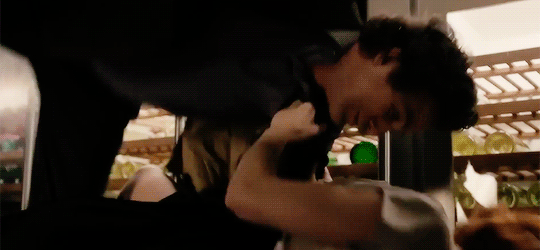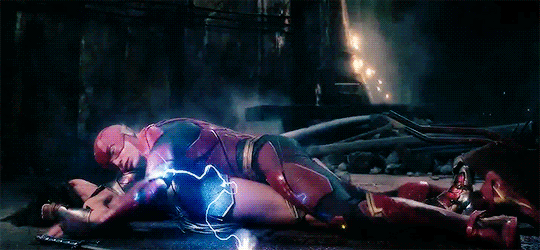I don't know, the world didn't stop spinning and we didn't all get flung into outer space from lack of gravity just because the ultra-violent, not-at-all-kid-friendly RoboCop 2 was made after a RoboCop cartoon, toy line and lunch boxes had been on shelves for a few years. (Yes, yes, I know, something something eighty years of history, don't come at me with that.)
I'm sorry, but eighty years of how a story relates to its target audience matters.
I guess I really just don't buy into the idea that there are immutable aspects of characters that can't be changed for any reason, and that to change them is "perversion."
I do if the character is closely tied with certain ideas and themes, and if they're closely tied to target audiences who have unique psychological needs.
I think a good example is Peter Pan. There are plenty of variations of Peter Pan, but in the end it is always supposed to be a story that children can watch about the dichotomy between who we are as children and who we are as adults, about that tension between the two. You can do versions of Peter Pan about how being a child forever is good; you can do a fairly radical reinterpretation like Hook, which is about Peter having lost his childhood self and needing to find it again before he can return to his adult life and fatherhood. You can even do something a little harder to pull off tastefully, as the 2003 film version did -- that film was very much about the tension between childhood and adulthood that one experiences just immediately prior to going through puberty (it even ends with Peter and Wendy sharing their first real kiss).
So there is a lot of room for variation and reinterpretation. But if the version of Peter Pan that comes out is ultimately about how much better being an adult is than a child and is something a child can't watch safely... Well, I'm sorry, but that's not really Peter Pan in any meaningful sense at that point. That's a new character for adults that has the same name as Peter Pan.
Which is fine, if this work is acknowledged as having become something new! Watchmen was originally going to be about the Charlton Comics characters, but Alan Moore realized that his deconstructionist reinterpretation had caused his depiction of them to so radically diverge from the originals that it would be more appropriate to present them as original characters -- pastiches of the Charlton Comics characters rather than direct adaptations.
(Frankly, Snyder's Superman strikes me being about as different from Superman as, say, Moore's Rorschach is from the Question. I'd have significantly less of a problem with his vision of Batman and Superman if they were depicted as separate, pastiche characters.)
I would also say that how much divergence a property can reasonably have and still be itself is going to vary. Different properties are going to have different relationships with their themes and ideas. Star Trek was always for adults first and kids second, and from the start it chafed at the limits imposed upon it by the standards of 1960s American broadcast television. Attempts to turn it into a hit with kids have frankly never worked out. So I don't think that darker versions of Star Trek like DIS or PIC violate the fundamental ethos of the show, even when they feature graphic violence.
I don't think the longevity, or "legacy," of a character really determines how far one can and cannot go with adaptation / conversion / modification / what have you.
I think longevity matters if that longevity has meant establishing a target audience of children and has been implicitly promising that it's a story that belongs to children first. It's not "eighty years" per se -- it's "eighty years they've been on children's lunchboxes."
I mean, okay, let's take Sherlock Holmes. At the core, Holmes is a drug-addicted narcissist who also happens to be a genius at solving crimes. If a new line of novels came around that had Holmes palling around with a former circus clown and a, I don't know, disc jockey who happened to work for K-RFT, MY-KROFT RADIO, MY RADIO, ALL THE TIME, and they spend their time solving mysteries in an MMORPG ...
I don't think that would fundamentally violate the Sherlock Holmes ethos as I understand it. Sherlock Holmes, after all, began as pulp adventure novels marketed towards adults, about, as you say, a drug-addicted narcissist genius who solves crimes, with a less-astute audience-insert sidekick in the form of Watson. If it happens in 19th Century England or 21st Century America or in a 21st Century MMORP with Watson as a radio D.J. -- well, hey, whatever. The fundamental ethos hasn't changed. He's still an apollonian figure whose conflict is against Dionysian violations of the social order (whatever that social order might be).
A real change in ethos would be if, say, Sherlock refused to solve crimes anymore and instead used his genius to always help violent criminals escape in the name of hating the police, or who's trying to foment an anarchist rebellion against the Crown. Those are just two examples off the top of my head, but in both examples he's no longer a figure whose job is to restore order against chaos.
Ultimately, where I boil down to is that I don't think that all possible adaptations or takes on a character or property are good, but I do think that they're valid. I like Zack Snyder's take on Superman a hell of a lot more than I like Gough and Millar's on Smallville,
I just don't care about Smallville. It strikes me as neither particularly damaging to nor particularly supportive of the Superman ethos. Frankly the most interesting thing about Smallville anymore is the horror of what kind of person Allison Mack became in real life.
but I don't argue that one is less worthy of existing than the other,
I mean, Zack Snyder and Warner Bros. have free speech rights and I'm not arguing for censorship. But I am arguing that his work disrespects others' works, and disrespects the child audiences Superman and Batman were created for. I am frustrated with adults (creators and fans alike) who appropriate children's stories for themselves away from children, because frankly I find it selfish on adults' part when we center our tastes over children's in those contexts. There's not wrong with, say, doing a Superman pastiche like Brightburn, or a comic book one-shot like Red Son. But if the biggest Superman movie is for adults and expounds toxic ideas about masculinity and women's roles in the world, or if the newest issue of Action Comics is something a kid can't read, then, yeah, I find that creatively and morally objectionable.
I also argue that many of the themes he expounds in his Superman and Batman films -- moreso in Batman v Superman than Man of Steel, which I was pleasantly surprised by -- are deeply harmful.
and the pearl-clutching, both in its frequency and its intensity, is really quite ... well, simultaneously confusing and fascinating to me.
There is a big difference between having strong opinions about what are and are not bad creative choices in specific contexts and "pearl-clutching."

 talk about boring.
talk about boring.

 Huh? I never got a hint of anything sexual about that scene, violent or otherwise. The fact that you came up with that probably says more about your outlook than that of the filmmakers.
Huh? I never got a hint of anything sexual about that scene, violent or otherwise. The fact that you came up with that probably says more about your outlook than that of the filmmakers.

